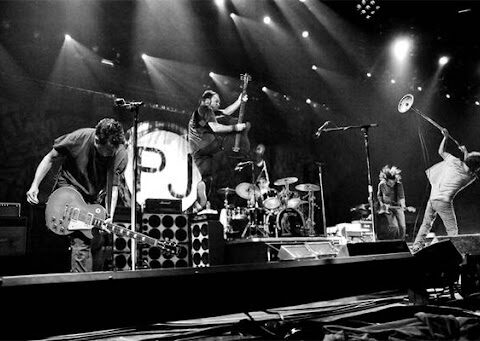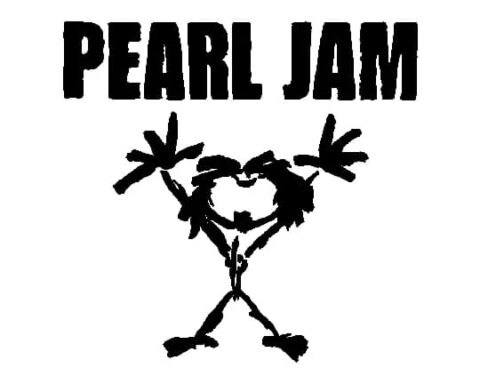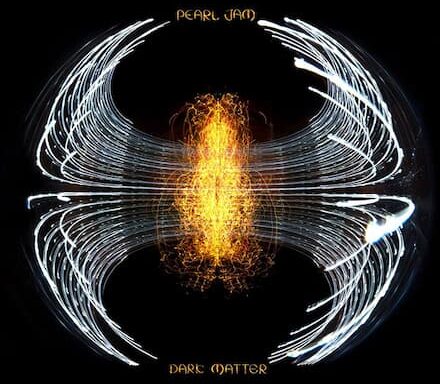Alright, so ‘saved my life’ might be a slight overstatement.
What’s more accurate is to say that it really saved my sense of connection to music and the world at a point in time when I had really drifted too far from any sense of meaning, connection or wonder with my life or the world.
The year was 1996 and I was fifteen years old, going on sixteen. And I had been in a major depression at that time, for various reasons.
Among a number of more personal, specific things – which I won’t go into here – I remember one of my lesser hang-ups being a sense that everything good or great in music had already happened. Music was – then, as it is now too – extremely important to me. Nirvana had been my favorite band, but that had ended two years earlier. Blind Melon, probably the band I was most enthusiastic about after Cobain’s demise, was now over too – Shannon Hoon fatally overdosing in late 1995.
Now that I’m much older, I don’t think in the same terms – but when you’re a teenager, a year can seem like an eternity, whereas the same amount of time now feels like the blink of an eye.
There were actually two albums in 1996 that, together, restored my sense of connection and sense of enthusiasm. Pearl Jam’s No Code and Soundgarden’s Down On the Upside (which I’ve already posted about here).
Both albums made me excited about music and ongoing possibilities. Both albums enthralled and occupied me for months, giving my then-adolescent brain something to be enthusiastic about and something to be excited about listening to again and again in my bedroom at the weekends or when I got back from school.
With Pearl Jam, at that time the bits of music press I had been reading suggested the band was on the wane and probably wouldn’t last much longer. Also, by 1996 the popularity of the ‘alternative’ scene and the ‘grunge’ scene in particular seemed to be waning too. People weren’t necessarily talking about Pearl Jam, Soundgarden and others the way they had been even a year earlier.
But when No Code came out, I went out and bought the album (on cassette tape, just like all my albums at that time), brought it home, went into my room, turned out the lights and got under the bed covers with my walkman (pre-digital mp3 player) and listened to the tape all the way through.
It was a semi mystical experience. It wasn’t an album that revealed itself with any immediacy either – not the way, say, Vs or Ten had. It was a strange, awkward collection of songs, from a band that was in a strange, awkward stage in its life. It took repeated listening – every night for about a week – to fully understand or get a firm grip on the album.
Even now, if I listen to that album on crisp CD or in mp3 format, something feels wrong with it. Sure, the sound quality is a million times superior; but my mind got so used to hearing it with the imperfections of an analog cassette tape – white noises between tracks, the ever-present hiss or intermittent crackle, even the B-side being faintly audible in reverse during gaps between tracks while listening to the A-side.
I’m not sure I can make a convincing argument for No Code being Pearl Jam’s best album. For me, it’s either No Code or its 1993’s Vs or 2000’s Binaural.
But everyone has their own favorite PJ album. What I can argue is that No Code is Pearl Jam at their most mystical, transcendent and most varied.
Take something as strange, quiet and spiritual as ‘Sometimes’, something as exotic and ritually repetitive as ‘Who You Are’, something as abrupt and blistering as ‘Lukin’, as ponderous as the spoken-word ‘I’m Open’, and as downright transcendent and disarming as ‘In My Tree’, and you’re dealing with a record that really is its own unique, inimitable entity.

This was not a band trying to prove anything, live up to anything, and really not a band trying to have a ‘hit’ record to match its previous successes.
The way ‘Sometimes’ opens the record is extraordinary. It’s the quietest, strangest of songs, whose genius is in its remarkable refrain. Awkward, tentative and feeling incomplete somehow, parts of the vocal are so quiet that they’re almost whispered. It’s a song almost without structure; it kind of just goes along, then shifts minorly into a different bit and then builds to a kind of climax, but there’s no discernible chorus or verse distinction. It simply is what it is – a song that came from somewhere and feels like it disappears back into somewhere too (the fade-out rather than dead-stop is appropriate).
Like No Code itself, ‘Sometimes’ simply is what it is and doesn’t care to be something more ‘finished’ or ‘mastered’.
And like No Code itself, ‘Sometimes’ feels like a vaguely mystical journey. It is the perfect, oddest, way to start this album.
This track entranced me every time I heard it; and the way it fades out slowly makes it feel like it never really finished. It is possible Vedder’s vocals have never felt this delicate or fragile: yet it is also an open-hearted stream of poetry at the same time. The minor effects to create the sound of thunder and rain are another beautiful touch that imparts the track even more sense of quietude and intimacy – that sense that you’re pressed up against a window during rainfall.
This thunderstorm effect was recreated when I watched the band play ‘Sometimes’ at Wembley in 2000 – which was a wonderful surprise to me at the time. The effect was simply created on the guitar (Eddie’s, I think – though it might’ve been Stone Gossard’s). The fact that Pearl Jam opened that show – the first PJ concert I had ever been to – with this song felt incredibly special to me at the time too, as it isn’t an obvious way to open a big rock show, just as it isn’t an obvious way to open an album.
I realise now that I’ve spent five paragraphs talking just about the opening track – but that demonstrates what a special, curious piece of music it is.
The next thing that always felt incredible about No Code is this: just as the dying strains of ‘Sometimes’ are slowly fading out, the second track – the monster rock-out, ‘Hail, Hail’ comes thundering in like a fucking avalanche. The first time I experienced this transition, it properly startled me (literally skipped a heartbeat). It was an actual what-the-fuck moment: there I am, under covers with my headphones on, and this soft, sweet, quiet song is slowly fading out like a dream – then suddenly, abruptly, this humungous fucking wall of sound comes crashing in with massive drums and layers of guitar.
I’m convinced the band did this on purpose to disorient listeners: if you listen to it, ‘Sometimes’ doesn’t properly end but slowly fades, and ‘Hail, Hail’ doesn’t have a proper intro or lead-in – it just *arrives* loudly and in full swing. It also comes in before ‘Sometimes’ has properly, fully faded out.
This transitional dissonance must therefore be deliberate.
Even now, when I hear it, I still brace for the beginning of ‘Hail, Hail’. It’s a brilliant track too; flowing and soaring seamlessly from its beginning-less beginning all the way through to the end. It is one of PJ’s best all-out rock numbers; unpretentious, primal and dripping with sincerity, the lyrics read like a bittersweet ode to love, while the composition makes it sound and feel massive.

A friend of mine, who I introduced to Pearl Jam back in the late 90s, devoured almost the entire PJ catalogue in the space of about a fortnight: he said that ‘Hail, Hail’ was the song he loved the most from that initial ‘binge-listening’.
Things then slow down with ‘Who You Are’; a slightly oddly paced and oddly toned composition, which was a strange choice for the first single to be released from No Code. It grows on you very easily though and is very interesting, with its eastern-sounding percussion, chant-like repetition and lack of obvious chorus or structure. We’re three tracks in and we’ve already had two songs without choruses, which is fascinating. I wasn’t all that enamoured with this song the first few times I heard it, but it later became a very welcome presence.
Thinking about it, ‘Who You Are’ might have been in part influenced by Vedder’s collaborations with the extraordinary Pakistani Qawali singer, Nusrat Fateh Ali Khan, the year before No Code was released; it has that kind of vibe to it. It also has a vaguely Mad Season feel to it too. It sounds like something that might be sung around a campfire.
‘In My Tree’ follows immediately; and this is one of the album’s outright moments of genius. I was obsessed with this song for all of that year and a long time beyond it. If ‘Who You Are’ feels a little exotic or eastern-influenced, ‘In My Tree’ takes some of the same vibe and ups the ante. It is a brilliant, brilliant composition. Jack Irons‘ percussion work throughout this song – and particularly on the opening verse – is mesmeric. As much as I love what Soundgarden’s Matt Cameron would later bring to the Pearl Jam dynamic, ‘In My Tree’ is a key reason I always wish we’d had a couple more albums with Irons.
‘In My Tree’ is almost a mystical, spiritual experience again; the composition fits that description in its effect, but Vedder’s lyrics certainly have that quality too. Musically, it is spellbinding; Irons’ stunning percussion and Jeff Ament’s simple bass line carry the song to begin with, with Vedder delivering the first verse in a low register. But then the song builds and builds, with layers of instruments coming in a bit at a time to create a mesmerising tapestry of sound. Moments of it are even a little discordant, particularly the brief bridge – and Vedder’s vocals crack and falter in places – but it takes nothing away from the sheer sonic thrill of this composition and actually even adds to it in some ineffable way.
In the end, the song reaches such a height that it almost can’t go anywhere; and so it slowly fades out, the wave of instruments and tones still going as we strain to keep listening – and eventually we hear it no more and ‘In My Tree’ is presumably still playing out in some parallel reality (with ‘Sometimes’).
This really is one of Pearl Jam’s very best compositions; and one of my all-time favorite songs. Vedder’s lyrics are also highly evocative, capturing a deep, primal sense of craving, longing for calm, safety and centering. There is also something about this song – when all the elements are taken together – that transcends description and genuinely feels transcendent and immensely powerful.
If pushed to name my favorite PJ song, this would be one of the top three or four contenders.
We then go to ‘Smile’, which is a downcast, downbeat song, in some ways similar to ‘Who You Are’ in its slowish-paced dirge; probably the most downbeat song on the album. But it works. Again, like three of the four songs preceding it, ‘Smile’ feels a little off-beat, a little off-balance. But it gets under your skin and into your veins pretty easily. It’s a song I always seem to forget exists until I listen to the album again and it shows up; and, every time, I end up listening attentively to every bar of it. The simple, somewhat repetitive lyrics are offset by a rich fusion of guitar sounds and by harmonica interludes that add an even more bluesy vibe to the affair.
‘Off He Goes’ closes off Side A (I’m still thinking of the album in cassette tape terms – I can’t help it) with a quiet, reflective, acoustic vibe. The lyrics capture the imagination and read like a story in the same way ‘Elderly Woman…’ from Vs does. It’s an unremarkable composition, but a rich result.
‘Habit’ is the exact polar opposite to ‘Off He Goes’ in every respect: a blistering, heavy rock-out, riding on a fat, killer riff and with Vedder virtually barking out the verse vocals in a slightly unhinged manner. It’s a kick-arse track though, which I never, ever get bored of.
‘Red Mosquito’ might be described by some as the most classically ‘Pearl Jam sounding’ piece of music on No Code; a rich, lush-sounding production with lucid Vedder vocals and rich layers of guitar, making it sound like it could easily sit on any of PJ’s three previous albums. It’s hard not to love this track though; it sounds so classic and so gorgeous.
‘Lukin’ is easily the angriest thing on No Code and one of the angriest things Vedder has ever sung. It almost feels like a throwaway song – it is over before it even properly gets going; an abrupt outburst of blistering punk/grunge rock that a verse, chorus and a verse and then abruptly grounds to a halt. Vedder spits out the vocals so quickly that he must be out of breath by the end of it. It was always a compelling, compulsive track though. Named after Mudhoney’s Matt Lukin, it is clearly about more than that though.
‘Present Tense’, like ‘Red Mosquito’, sounds more like ‘classic’ Pearl Jam. It’s chorus especially is addictive, putting it in the same sphere as earlier songs like ‘Alive’, ‘Daughter’, etc. It’s a very stripped-down, simple composition and doesn’t even have percussion until very late in the song; but it’s another curious, interesting piece of music that manages to sound so natural and obvious while still managing to be unusual and not-obvious at the same time.
‘I’m Open’ is possibly the oddest song on No Code. In terms of what I said earlier about this album having a definite spiritual, almost mystic, feel to it, this song is the most overt example of that, with half the song being Vedder’s spoken word monologue. Even this becomes pretty compelling, feeling like it acts as an underpinning of the entire album in spirit.
‘Mankind’, as far as I know, is the only Pearl Jam album track to not have Eddie on vocals. Stone Gossard takes vocals on what is a fairly unremarkable – in terms of composition – piece of straightforward rock music. It’s still a fun track to listen to – particularly for the novelty of Stone on vocals – but it isn’t as interesting as the rest of the album. But on a record that had so many unexpected or unorthodox things on it, ‘Mankind’ makes perfect sense as the penultimate number.
My one gripe has always been that I would’ve swapped ‘Mankind’ and ‘I’m Open’ in the track order and had the latter as the second-from-last song.
That leaves us with ‘Around the Bend’: a slow, quiet, low-key and unpretentious end-point for a fascinating musical journey. You really get the sense that Pearl Jam were so relaxed by this point, so comfortable in their own skins and so uninterested in impressing anyone, that ‘Around the Bend’ is what happens when musicians are truly able to be themselves and do whatever they want. In its sheer understatedness, ‘Around the Bend’ manages to actually become prominent in a weird way. I always loved this track, which I found a tad hypnotic and a little soothing.
Strangely enough, there was a girl I was really into at around this time and who I was friends with: she hated Pearl Jam (for some reason), but said ‘Around the Bend’ was the only PJ song she liked. Which I found bizarre, needless to say. There was also one of my friends’ (and former band-mate’s) little kid brother, who used to put on ‘Around the Bend’ before falling asleep. He wasn’t a PJ fan either; but he claimed this song helped him feel ‘nice and relaxed’ and would help him drift off to sleep.
I later found out that, in fact, this song had been written by Vedder as lullaby for Jack Irons to play to his son, so this makes sense.
That’s a nice way to end an album.
Where does No Code rank in the PJ discography? I don’t think I’ve ever spoken to anyone who cited it as their favorite PJ record. But, as I said, for me, it’s No Code or Vs: Vs would probably be my sober, empirical answer – No Code would be my sentimental, more ineffable answer.
It’s also, in my opinion, the last PJ record in which Eddie’s vocals are still super-rich – and I say that as someone who loves Eddie Vedder, so it’s not a slight against later PJ albums, merely an acknowledgement that by 1998’s Yield album Vedder’s voice was no longer sounding as strong.
In any case, Pearl Jam’s ‘awkward’ fourth record is a very, very special piece of work.






